Red Nose Day

A huge thank you to everyone that donated money last Friday for Comic Relief. The Junior Leadership Team stood at the gate and shook their buckets and collected any donations. You are such a generous bunch of people and we managed to raise £337.97. Thank you again for your support.
Jack and the Beanstalk
It has been another fun-filled week in reception!
Jack and the Beanstalk
This week, we’ve been reading the traditional story ‘Jack and the Beanstalk’.


We discussed how this story has been retold many times and some versions of the story are different. Just by looking at two front covers, we could spot similarities and differences.
The story I heard had a musical instrument.
They both have Jack on the front.
He has the chicken in that one.
Word of the week
Every week, we look at a new adventurous word. We call this our ‘word of the week’. This week, our word of the week was ‘gigantic’ – linked to the story ‘Jack and the Beanstalk’. The children have enjoyed using the word during role plays and in their writing.
Can you spot our word in any of the writing below?

Observational drawing
This week, we have focused on drawing daffodils using oil pastels.
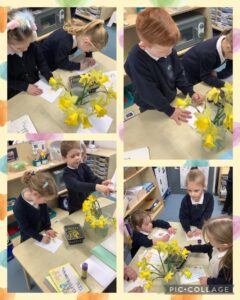
Planting a (magic) bean
After listening to the story, the children all agreed that we should plant our own bean.
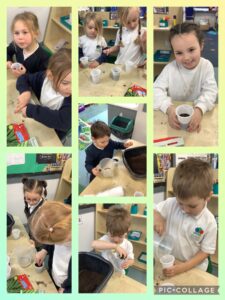

We then wrote instructions to explain to others how they could plant a bean too!
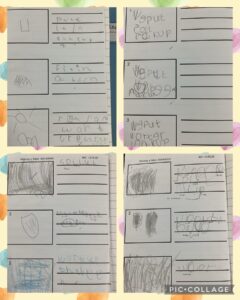
Maths
In Maths, we’ve been exploring the composition of numbers by investigating the numbers within 7 e.g. seeing that 7 can be made of 5 and 2.
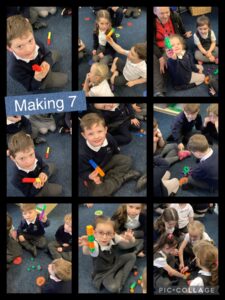
We have also used our magic bean machine to combine two numbers.


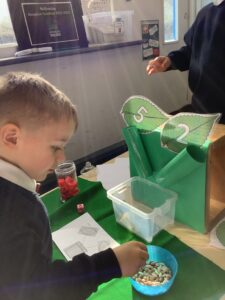
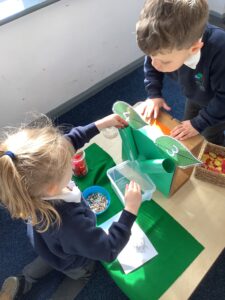
Phonics
This week, we have continued to read longer words with the chunking method.
We have also begun to read root words that make up compound words and discussing how the two root words create a new word with a new meaning.
Can your child show you the chunking method to read these words?
fantastic helmet zooming winking
Read these root words, then combine to make a compound word.
roof top farm yard car park
Poetry Picnic
Each week, we will be learning a new poem. We will recite this poem each day. By saying the poem out loud, we can focus on the sounds and rhythm of each word or line. We talk to the children about how this can help us become better readers. This week’s poem is Spring Wind.
We talk about how a poem sometimes has rhyming words and sometimes doesn’t. Can your child tell you the rhyming words in this week’s poem? We also talk about how a poem can have a fast rhythm or a slow rhythm.
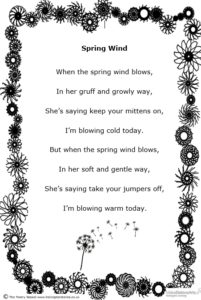
Reminders and Dates
Reception’s Class Assembly- 24.03.23 3pm
You are invited to our class assembly, where we’d love to share our learning with you.
Easter Disco – 3.30 -4.30 24.03.23
The Friends of Scholes have arranged the Easter Disco after school. Parents are not required to attend. The price (£3.50) includes a drink and a bag of sweets. If you would like your child to attend the disco, payment must be made on the Gateway app.
Reception trip to The Railway Museum, York- 30.03.23
Please drop-off and collect your child at the usual times. School can provide a packed lunch but if you’d prefer your child to bring their own, this is also fine. Every child will need a suitable backpack that they are able to carry themselves throughout the day.
Spring 2 Week 3!
Can you believe we’re half way through Spring 2 already?! We’ve got even more great things planned for the rest of the term, so watch this space! Here’s what we’ve been learning this week.
The Hundred Decker Bus
This week, we’ve been reading another ‘Hundred Decker’ story by Mike Smith. The Hundred Decker Bus

In this story, a driver who is bored of his daily routine decides to take himself and his passengers on a long ‘adventure’. As more people get on the bus, more decks need to be built!
Linked to the story, we’ve been comparing cities/towns to the countryside, discussing similarities and differences. Countryside is our ‘word of the week’.
We’ve also been playing ‘eye spy’ in our writing task, looking closely at just one of the decks.
Did you know?…
Each morning before phonics, the children take part in an independent writing challenge. They look at an interesting ‘image of the day’ and simply write anything that they notice. This has really boosted the children’s confidence to ‘have a go’ at writing on their own. Take a look at some of this fantastic independent writing.
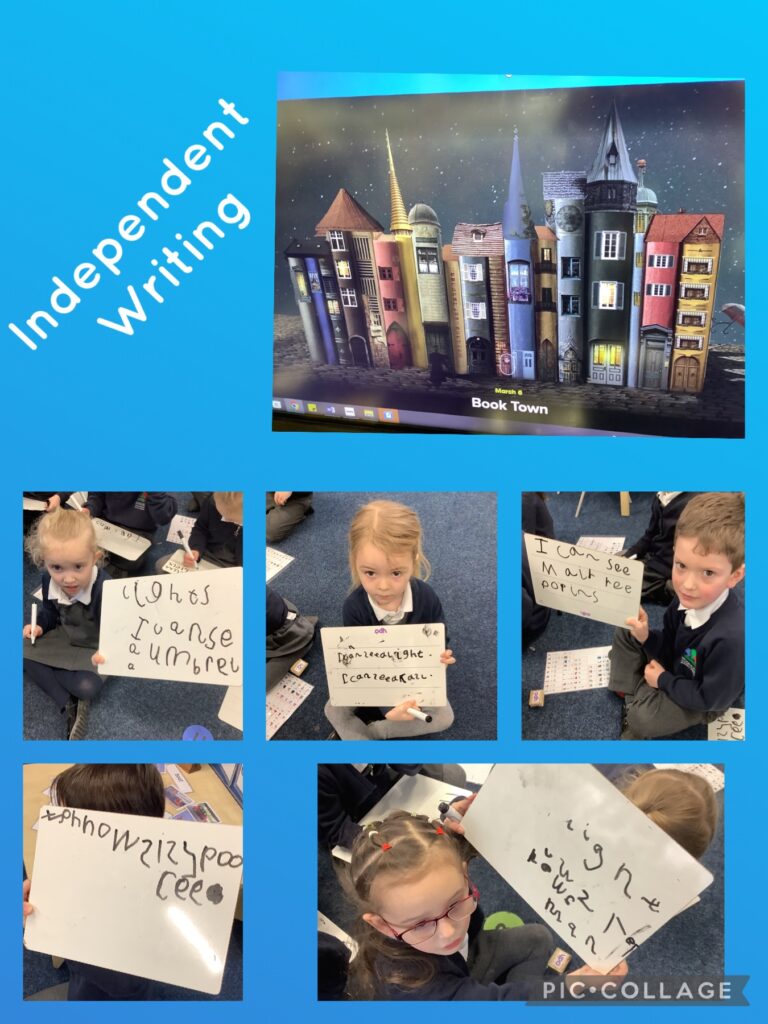
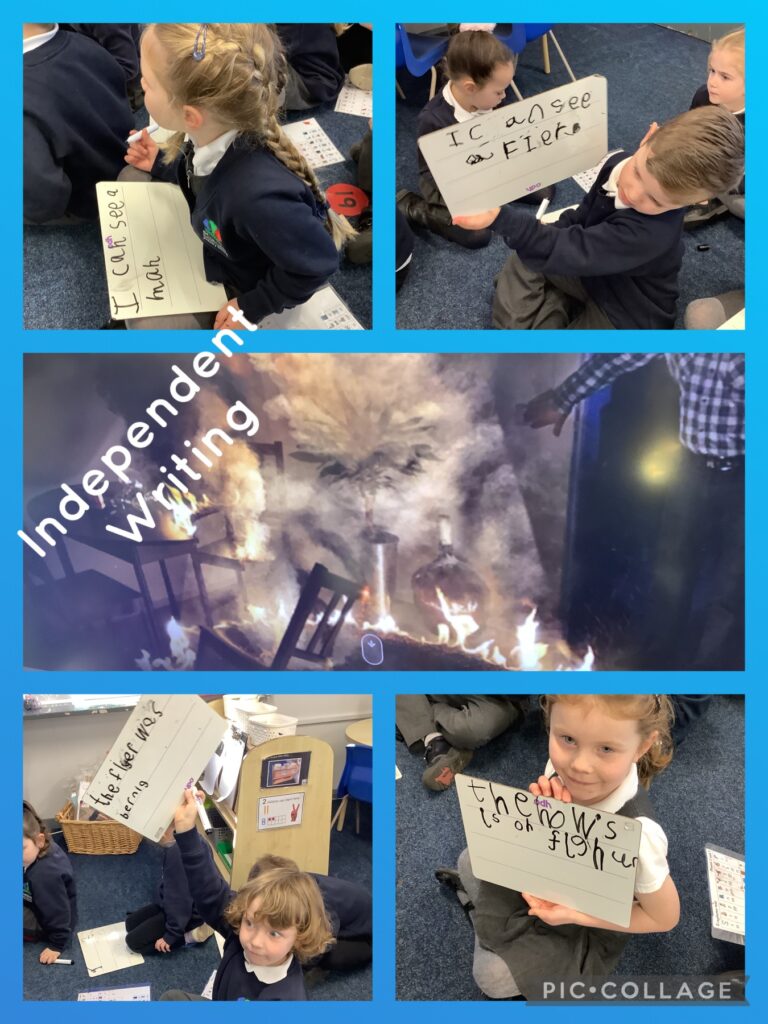
Computing
This week, we’ve been using Bee-bots. Bee-bots are an early coding resource. Children have to program the bee using directional and ‘GO’ buttons. They have to pre-plan the algorithm they need to enter, to successfully get the bee to its intended location.
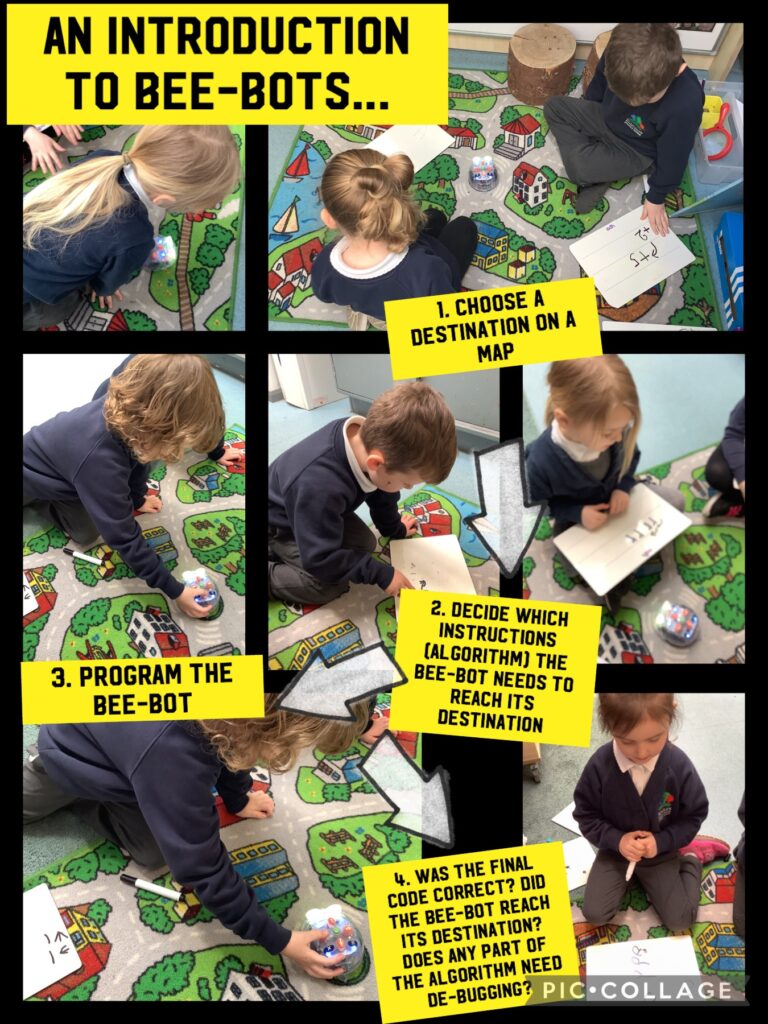
RE/ Living and Learning
We’ve been thinking about how special times are celebrated. Wednesday 8 March was the Hindu festival Holi. Here’s what the children remembered about the festival.
For the celebration, they celebrate colours, Spring, love and new life!- Ted
They got messy with paint!- Mollie B
The temple was very special- Tilly
They eat lunch (at the temple)… it’s really nice and special- Esther
We decorated outlines of people with colourful Holi paint.
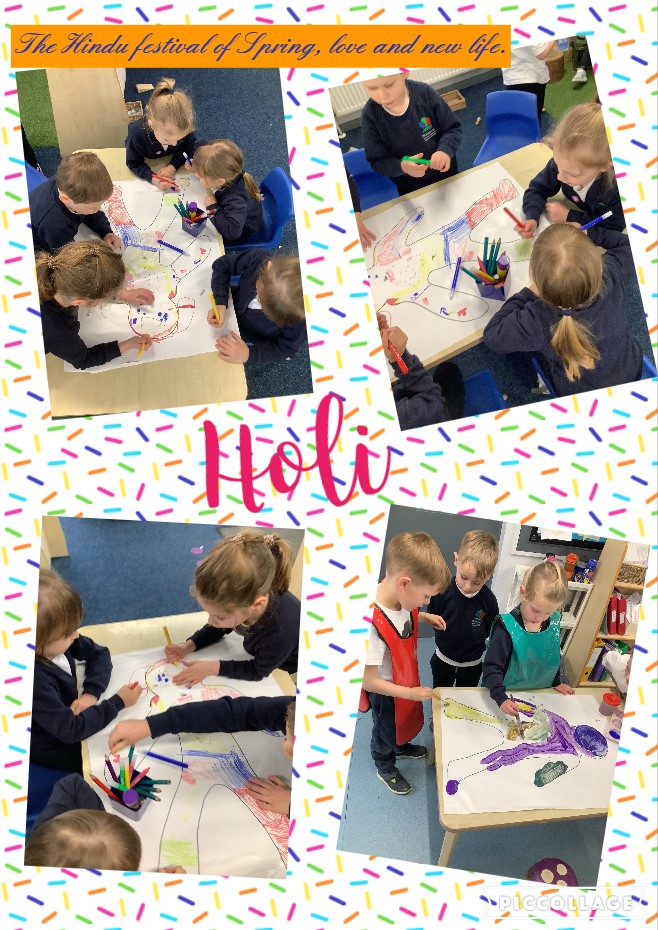
As a time to celebrate with friends and family, we linked Holi to our living and learning statement: I recognise that friends and family are important. We spoke about our loved ones in our families and some children chose to draw their family too.

Snow much fun!
Snow always brings much excitement. We’ve enjoyed short bursts of time exploring the snow. On Thursday, we had a snowman building competition to see who could build the tallest snowman in ten minutes. Each team decided on a name for their snowman. We had Timmy, Daisy, Mr. Grinch, Chocolate, Slippery, Stanley and Cupcake ⛄ Well done to team Chocolate, who built the tallest snowman at 73cm!

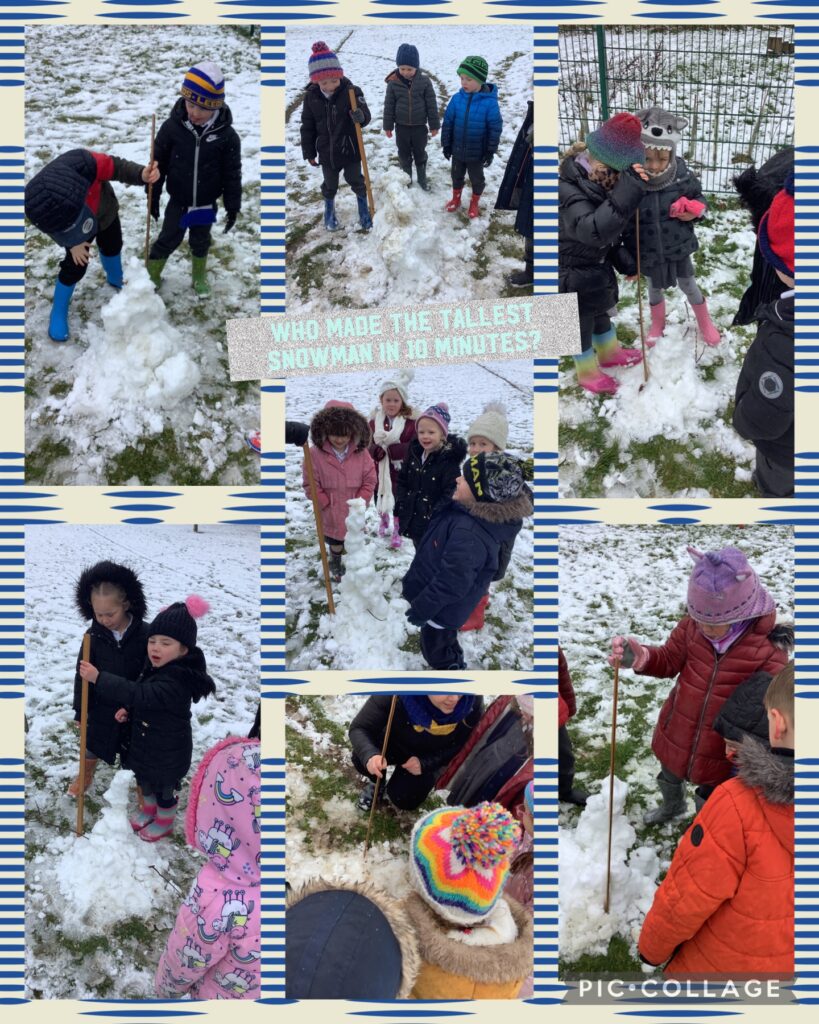

Maths
In Maths, we’ve been comparing numbers and noticing whether change creates a number that is more or less than another.
In provision, we used the ‘bus stop’ number story to explore subtraction (creating less) and recorded our number stories.
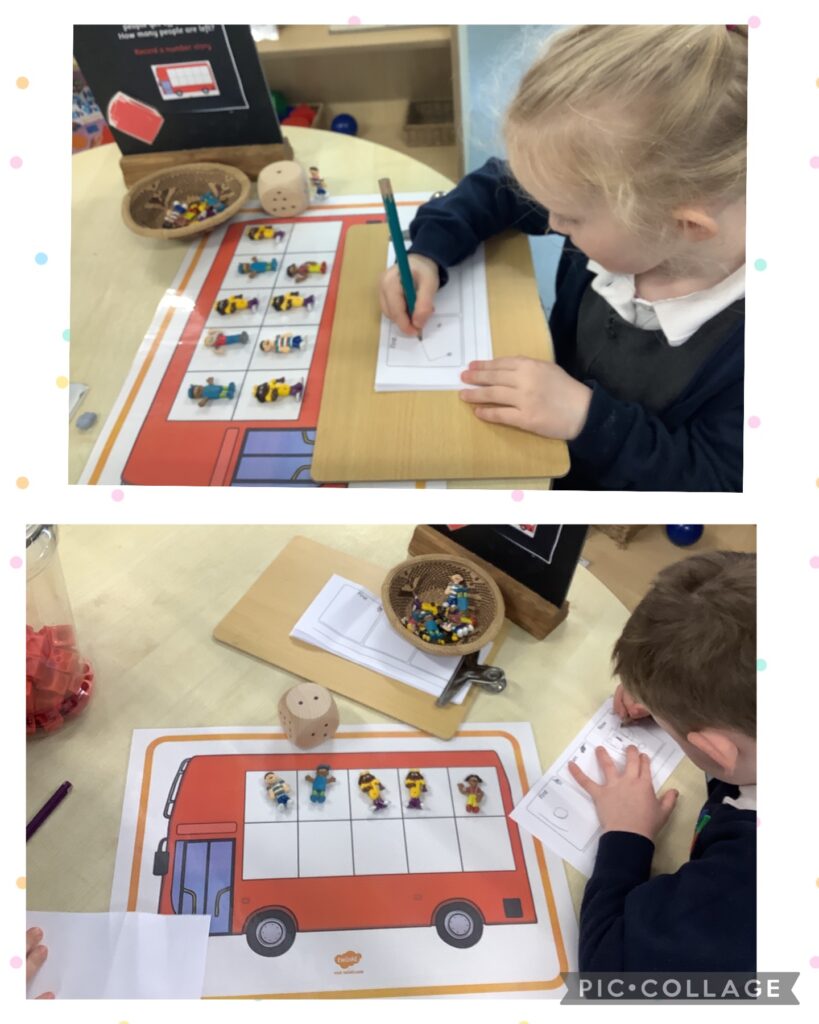
Phonics
Spring 2 week 3 has been a review of phase 3 sounds, reading words with two or more digraphs. We review tricky words daily.
Tricky words can be just that-tricky! We’ve previously introduced a few fun games you can play at home to practice tricky words. Here’s another you could try…
Tricky word stick person (a modified version of the ‘hangman’ game)
We often play this game in class. Write the correct number of dashes for your chosen tricky word and let your child make guesses. Encourage your child to use letter names rather than sounds for spelling tricky words. Draw a part of the stick man for each incorrect guess- you can give extra chances by adding a hat, shoes, gloves etc. to the stick person!
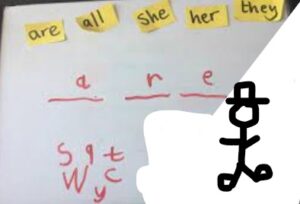
Poetry Picnic
Each week we will be learning a new poem. We will recite this poem each day. By saying the poem out loud, we can focus on the sounds and rhythm of each word or line. We talk to the children about how this can help us become better readers. This week’s poem is the traditional nursery rhyme Pat-a-cake, Pat-a-cake
We talk about how a poem sometimes has rhyming words and sometimes doesn’t. Can your child tell you the rhyming words in this week’s poem? We also talk about how a poem can have a fast rhythm or a slow rhythm.
As a traditional nursery rhyme, we spoke to the children about how words might change in different versions of the song- you will see this in our video.
Reminders and Dates
Comic Relief: Red Nose Day- 17.03.23 We will be marking the occasion in school with a non-uniform day and invite you to make a donation. Find out more about Comic Relief:
https://www.comicrelief.com/rednoseday/
Reception’s Class Assembly- 24.03.23 3pm You are invited to our class assembly, where we’d love to share our learning with you.
Reception trip to The Railway Museum, York- 30.03.23 Please drop-off and collect your child at the usual times. School can provide a packed lunch but if you’d prefer your child to bring their own, this is also fine. Every child will need a suitable backpack that they are able to carry themselves throughout the day. More details and a letter will be sent home.
The Hundred Decker Rocket
This week, we have continued to explore our topic ‘Let go’.
We have been reading the book The Hundred Decker Rocket.

This story is about a girl called Ivy who sets off on a mission to space. On the way, she meets some very messy aliens. When her rocket breaks down, all the aliens help to fix it and make their own deck.
We decided to create our own class rocket. Everyone enjoyed designing their own deck.
Mine is going to have a swimming pool.
Look! It’s got a ball pit.
I’m going to have a slide on my deck.
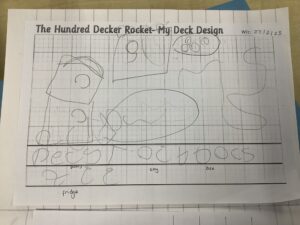

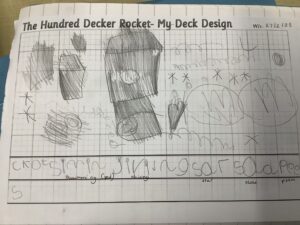
Top tip for watching YouTube with your child: go to the settings cog (it’s along the play bar) and turn off auto play – this avoids an inappropriate clip coming up automatically, and helps to discourage your child from passively watching clip after clip.
Word of the week
Every week, we look at a new adventurous word. We call this our ‘word of the week’. This week our word of the week was ‘expedition’ – linked to the story ‘The Hundred Decker Rocket’. We looked at the definition ‘ A journey with a plan’.
It was like an expedition when I went to London.
I went on an expedition to Lego Land in Denmark.
You might follow signs on an expedition.
Maths
This week, we have focused on consolidating our number sense by rehearsing the order of the first 10 numbers and understanding that the position that each number holds in our number sequence does not change.
By doing this, we were able to explore ‘one more’ and ‘one less’.
I know 3 is one more than 2 because 3 comes after 2.
It goes 4, 5 so 4 is one less than 5.
Phonics
This week, the children have reviewed er, air and longer words that contain double letters.
Write these words on paper and ask your child to underline the double letters before reading.
hammer shimmer cannot chatter muffin
Poetry Picnic
Each week, we will be learning a new poem. We will recite this poem each day. By saying the poem out loud we can focus on the sounds and rhythm of each word or line. We talk to the children about how this can help us become better readers. This week’s poem is Popcorn.

When reading, we focused on the rhythm of the poem and using short, sharp voices.
Science
We had lots of fun exploring magnetic and non-magnetic objects.
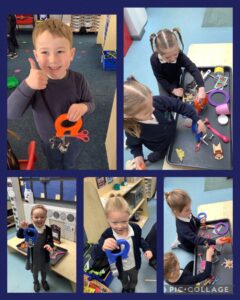
We tried scissors and it worked!
Look it’s picking the metal up!
World Book Day
We had such a fabulous day! We started the morning with lots of wonderful stories with our grown-ups. Then, we were visited by children from Year 3,4 and 6. It was lovely to see everyone sharing their favourite books. In our classroom, we engaged in lots of traditional tale themed activities.


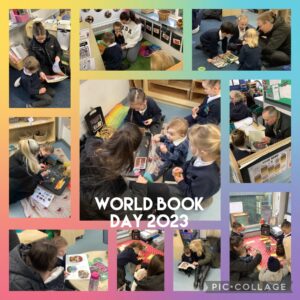

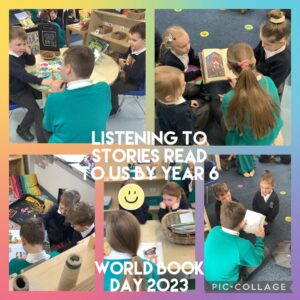
Let’s Go!
We’ve sprung into Spring 2 with great excitement for the term ahead! Outside, the sun has been shining and we’ve been noticing the first signs of the new season.

Pancake Day
On Shrove Tuesday, the children made pancakes. They learnt how to follow the steps of a recipe and check a list of ingredients. They followed the kitchen hygiene and safety rules. They had lots of fun mixing the ingredients and of course, tasting their creation!

The Train Ride
This half term is called Let’s Go! We’re starting with a focus on transport. This week, we’ve been reading The Train Ride by June Crebbin.

This story is about things that are seen out of the window, on a train journey. We noticed that the rhythm of the book’s repeated/rhyming lines start fast and repetitive (much like the sound of a train chugging along a track) and then as the train approaches the station, the lines become longer and the pace slows down until the train reaches is destination. Destination is our ‘word of the week’.
We’ve been discussing journeys that we have been on, either on trains or other modes of transport and what destinations we were going to. We’ve been writing about what we might see out of the train window.

Historical links
We looked at pictures of the early steam locomotive- Robert Stephenson’s Rocket. We compared it to the trains we use today.
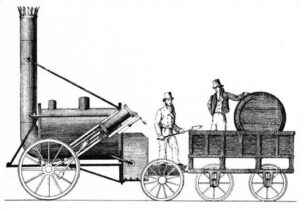
In the discovery area, we’ve been ordering images of trains from oldest to newest. We’ve also been looking at historical pictures of Scholes Train Station.
 Maths: Comparison
Maths: Comparison
We’ve been comparing groups of objects and toys, saying which has more and which has fewer. We’ve been using our mathematical reasoning to explain why size, colour and other factors do not matter when comparing ‘how many’. Here is an example of a conversation from a maths lesson this week:
The teacher had asked a child to share some toys with them, from a basket. In this instance, both the teacher and child had 4 toys each.
Child 1: Oh, you both have the same…it’s equal!
Teacher: Actually, this toy is my favourite. This toy means so much more to me than any of those others because I really like it, so I think I have more.
Child 2: No, it doesn’t matter about any of that! It doesn’t matter how much you love it or if it’s bigger, it just matters about how many.
Child 3: The quantity!
In the classroom, children have been making 6 using Numicon frames.

Phonics
Spring 2 week 1 has been a review of phase 3 sounds: ai, ee, igh, oa, oo, ar, or, ur, oo, ow, oi, ear, in words and sentences. We review tricky words daily.
Tricky words can be just that-tricky! We’ve previously introduced a few fun games you can play at home to practice tricky words. Here’s another you could try.
Roll and Read
You will need a die for this game. You may wish to print the boards or display them on a screen.
- Roll the die
- Count the spots, match to the correct row
- Choose a word to read on the row
- Cover the word when read correctly
- Repeat
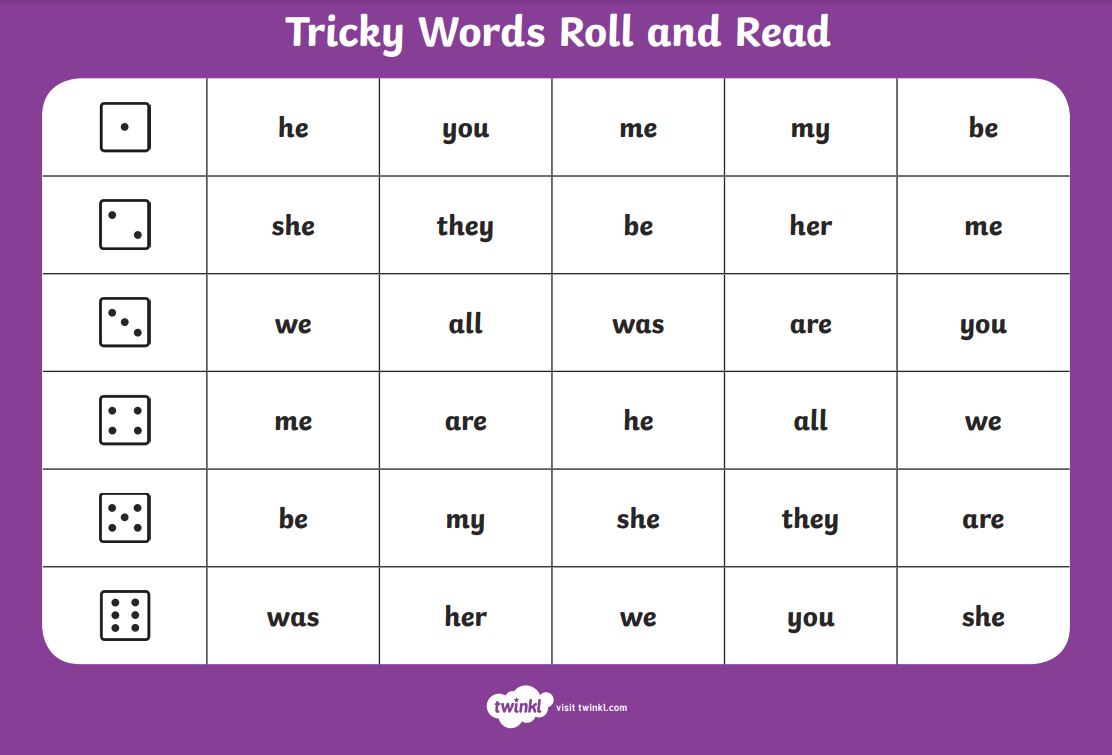
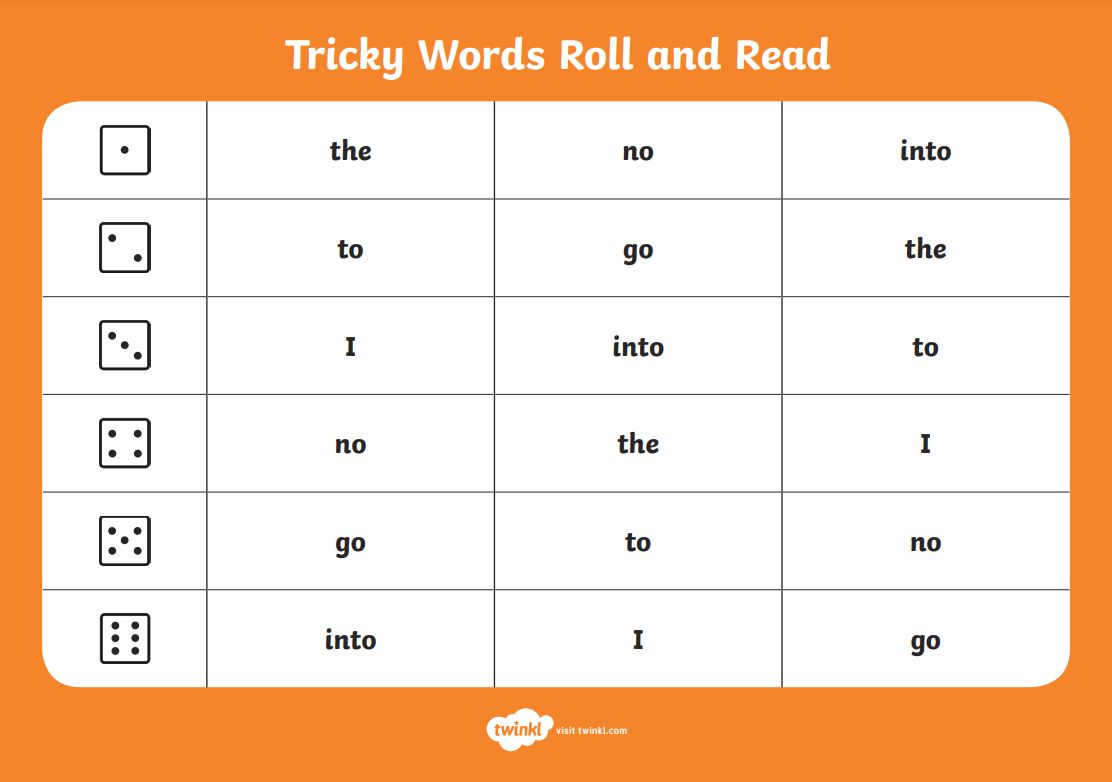
Who will be the first to complete a row?
PE
We are excited to continue having both swimming and Foot-Tech on Wednesdays this half term. If it is your child’s swimming week, they may have both swimming and a Foot-tech session that afternoon. Please ensure that they are wearing PE kit, rather than school uniform. This must include suitable PE footwear.
Here is another reminder of the swimming dates:
Rainbow Class- 22 Feb, 8 Mar, 22 Mar
Sunshine Class- 1 Mar, 15 Mar, 29 Mar
These dates are also stuck to your child’s classroom door or window to view whenever needed.
We will also continue to have PE on Fridays. This half term we are developing ball skills and counter-balancing in pairs.
Poetry Picnic
Each week we will be learning a new poem. We will recite this poem each day. By saying the poem out loud, we can focus on the sounds and rhythm of each word or line. We talk to the children about how this can help us become better readers. This week’s poem is Pancakes by Christina Rossetti
We talk about how a poem sometimes has rhyming words and sometimes doesn’t. Can your child tell you the rhyming words in this week’s poem? We also talk about how a poem can have a fast rhythm or a slow rhythm. Can your child re-tell this week’s poem to you?
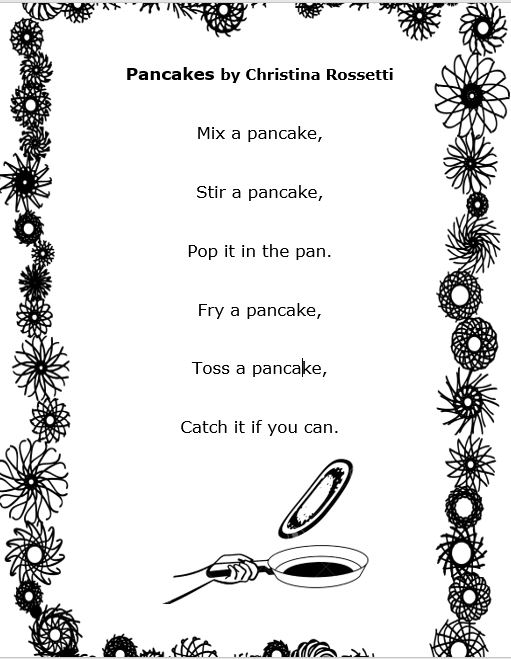
Reminders and Messages
Shoe Box: Please send a named, empty shoe box into school from Monday 27 February. This is for a special creative activity in the classroom.
World Book Day 2023: Relax and Read – Thursday 02 March Please join us in the classroom for an extended drop-off time (8.40-9.20) where you can relax and read books with your child. Throughout the day, we’ll have World Book Day themed activities. We’d also like your child to share their favourite book with their friends. Please send your child into school with their favourite book and please ensure the book is named. As stated on the school calendar, this is not a dressing-up year. Thank you.
Half-term sponsored maths challenge: Please remember to return your sponsored maths challenge forms by Friday 03 March 2023.
Great Fairies of the World
Great Fairies of the World

This week, we’ve been reading Great Fairies of the World by Stephanie Moss. This rhyming story features fairy characters that have jobs that help others; architect fairy, doctor fairy and engineer fairy, to name just a few! We’ve been discussing how the author uses the most interesting descriptions/words that they can think of. We’ve been describing images and making words more adventurous. This has helped develop our oracy skills and helped us in our writing too.


In our writing, we’ve created our own fairy characters and written about the jobs that they do.
In provision, we’ve linked our fiction reading to non-fiction information about real-life heroes in the community.

We’ve also used the fairy theme in our classroom challenges.
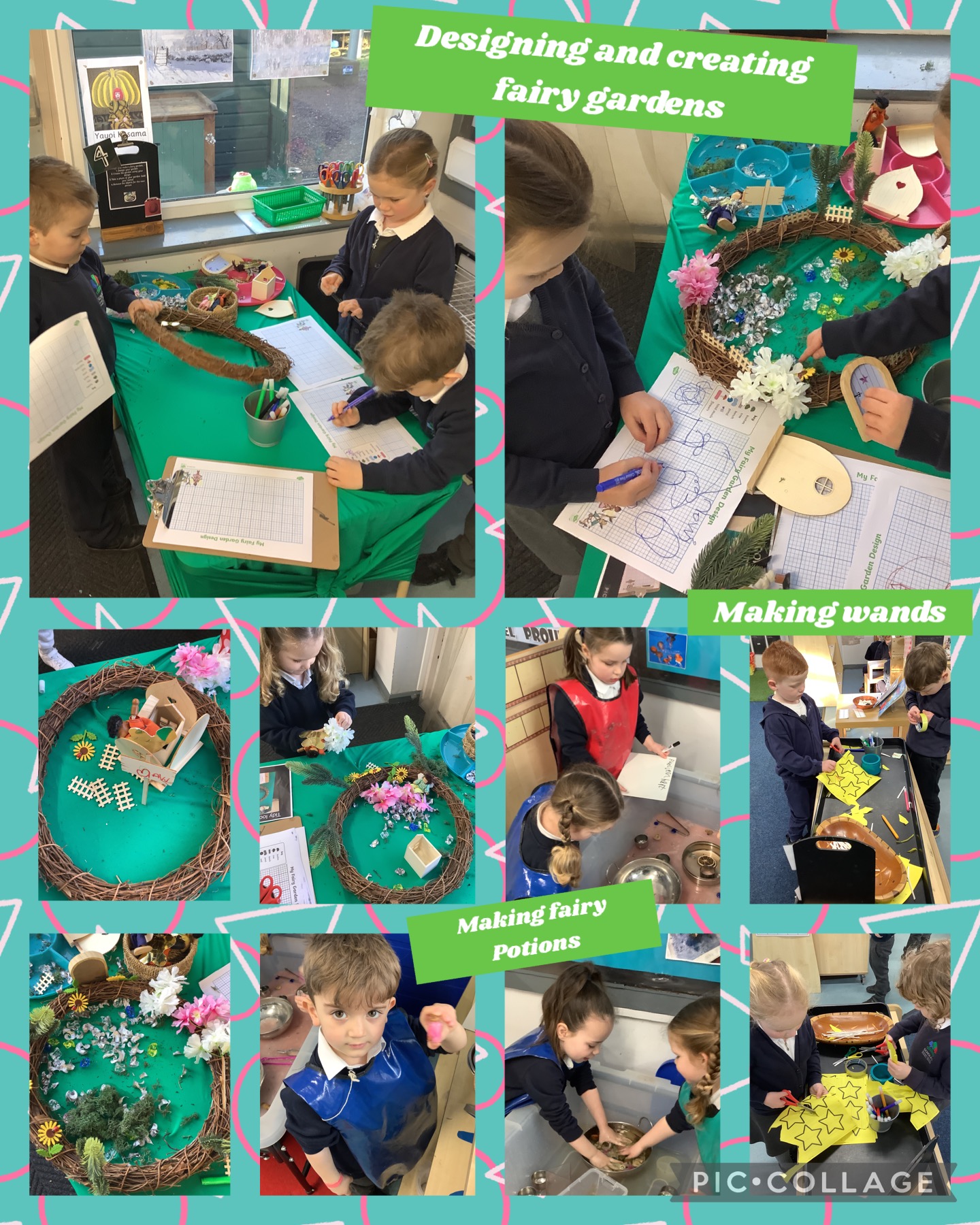
Living and learning: Internet Safety
This week’s living and learning statement is: I know that people should treat others respectfully when online.
This has coincided with Safer Internet Day (Tuesday 7 February)
When asked what being ‘online’ means and what you can do online, the children said:
It’s something on your phone- Sonny…
Or your iPad- Harry…
Or your tablet- Orlah…
Or your computer- Daniel
You can buy things on the phone- Skyla
You can send money to people- Grace
On iPads you can call someone- Mollie
Alexa!-Bella
We spoke about some important uses for the internet, such as the way we use it for our learning- our eBooks. We discussed how we should limit our time online to keep our body and brain healthy and why we shouldn’t use electronic devices close to bed time.
In Reception, we’ve used the story The Adventures of Smartie the Penguin to talk about internet safety. Smartie receives a tablet for his birthday but encounters some problems such as adverts, websites that are too old for him and people saying unkind things online, during a game. He makes the right decisions and always asks Mummy and Daddy for help. There is a memorable song throughout the story:
before you tap and click… you need to stop and think… and TELL someone!
Ask your child what they can remember about keeping safe online.
Maths: Length and height
We’ve been developing our understanding of how to compare and measure length and height. We’ve been ordering by length and comparing the length of objects; saying which are shorter, longer, the shortest, the longest, the same (equal). We’ve been measuring objects using non-standard forms of measurement. We measured the length of our bodies using different objects.


We built towers to compare height; saying which are taller, shorter and equal. We’ve ordered ourselves by height and have estimated how many bricks tall we are.

Phonics
It’s assessment week in phonics. We’ve been reviewing and revisiting our Spring 1 learning. Your child will have come home with a grapheme mat and a tricky word mat. If any sounds are highlighted on the grapheme mat, these are those that your child is not yet secure on. Please keep practising these at home.
Tricky words can be just that-tricky! In Little Wandle phase 3, we learnt lots of new words. The children will continue to learn new tricky words fairly rapidly over the Spring 2 and Summer terms. We’ve previously introduced a few fun games you can play at home to practice tricky words. Here’s another you could try!
Musical tricky words
- Write the tricky words on individual pieces of paper, lay them out on the floor
- Play your child’s favourite song for them to dance around to
- When the music stops, your child should pick a word to quickly run to and stand on
- Your child reads the word they have landed on
- Remove that word and repeat until there are no words left!
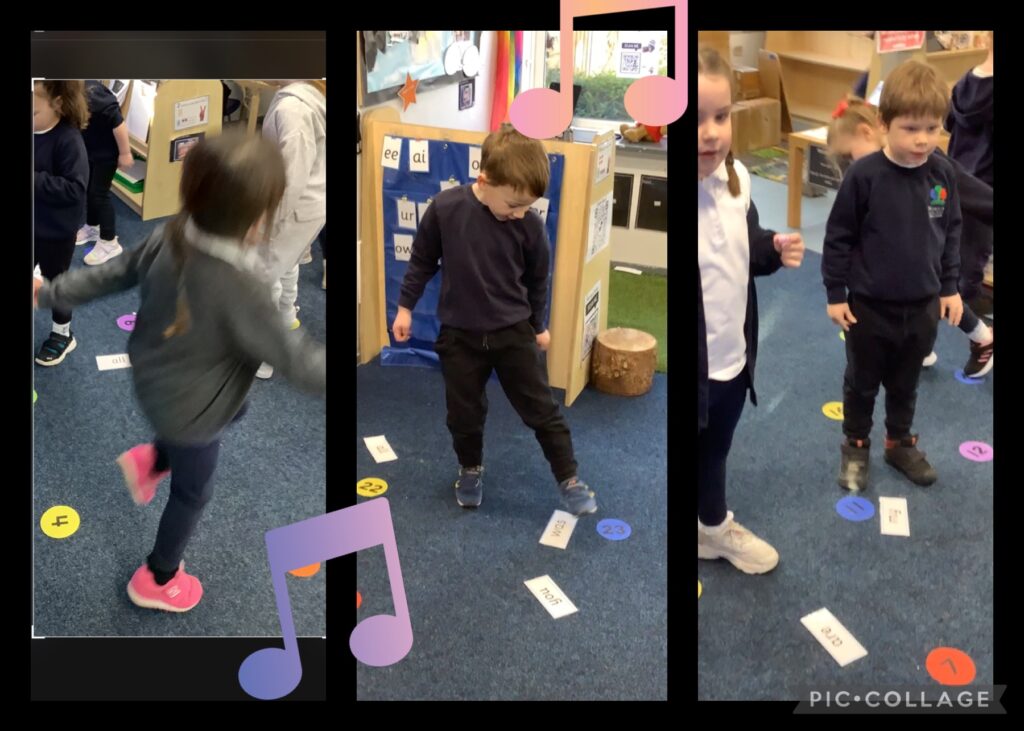
Focus Artist: Yayoi Kusama
Over the last few weeks we’ve been exploring the art of Yayoi Kusama. We’ve been colour mixing and using the paint to make dot pictures, drawn spots onto pumpkin pictures and decorated a vegetable using playdough spots. We’ve also made our own artwork, inspired by the artist.

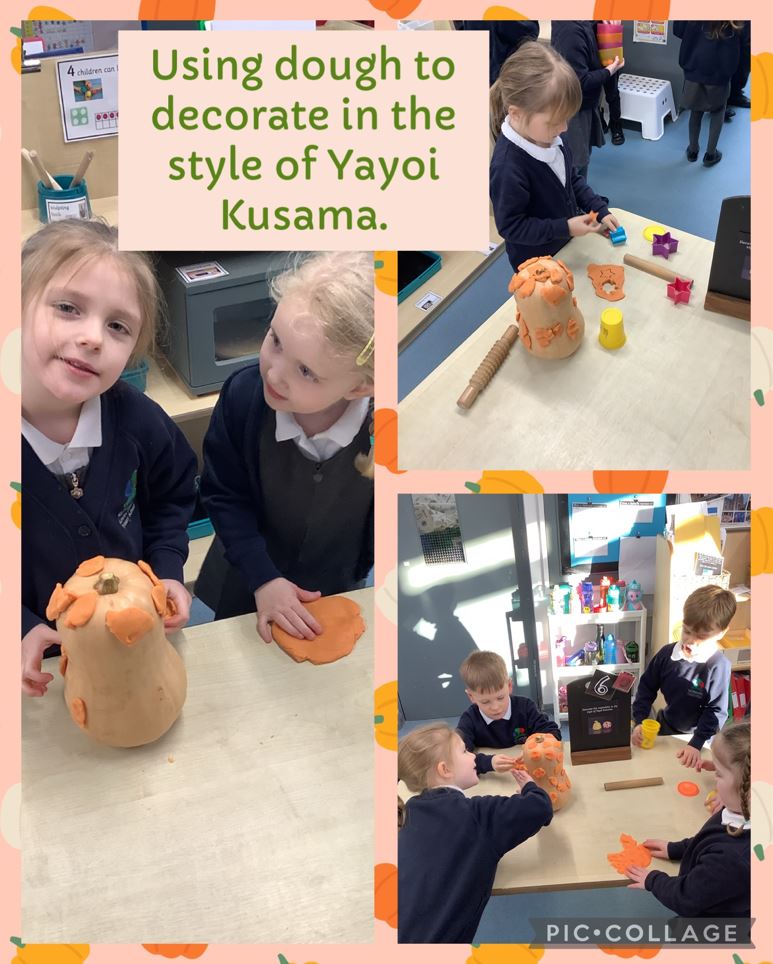
Poetry Picnic
Each week we will be learning a new poem. We will recite this poem each day. By saying the poem out loud, we can focus on the sounds and rhythm of each word or line. We talk to the children about how this can help us become better readers. This week’s poem is Furry, furry squirrel

We talk about how a poem sometimes has rhyming words and sometimes doesn’t. Can your child tell you the rhyming words in this week’s poem? We also talk about how a poem can have a fast rhythm or a slow rhythm. Can your child re-tell this week’s poem to you?
Fiddly fingers stay and play
Wow! Another fantastically busy stay and play last Friday. Thank you to parents and carers who were able to attend. The focus was on the development of fine motor skills and we aimed to demonstrate a range of activities that can be easily replicated at home. We hope you all enjoyed our Fiddly Fingers session!
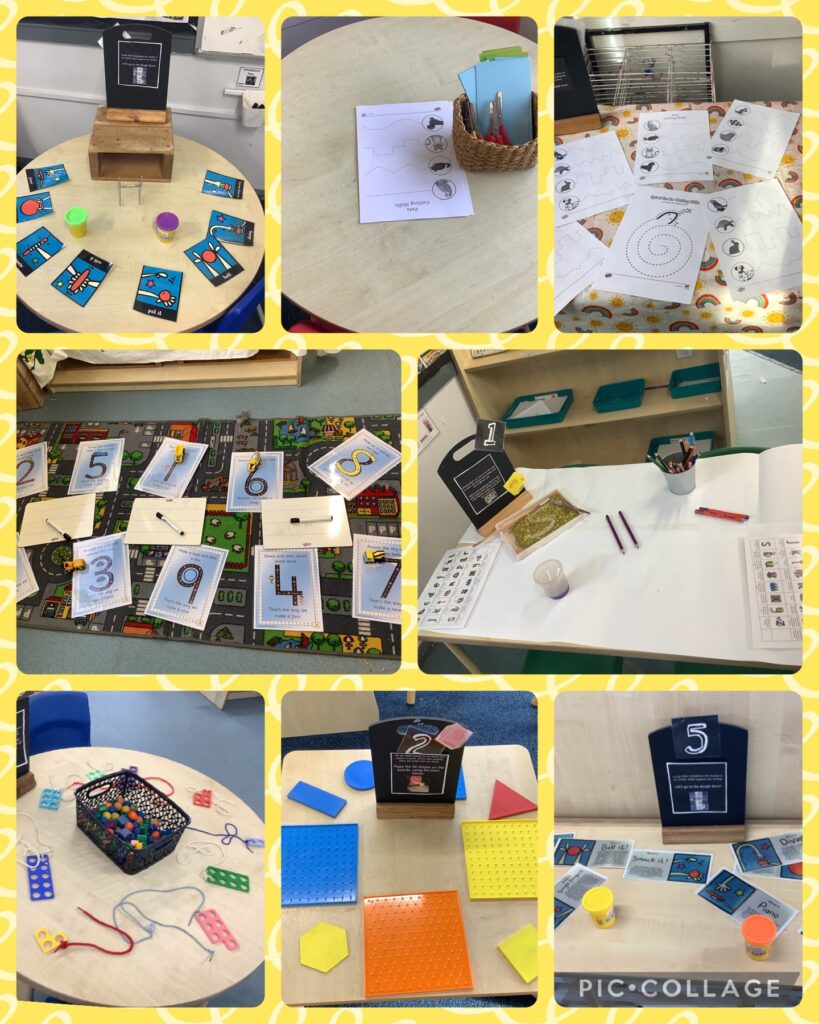
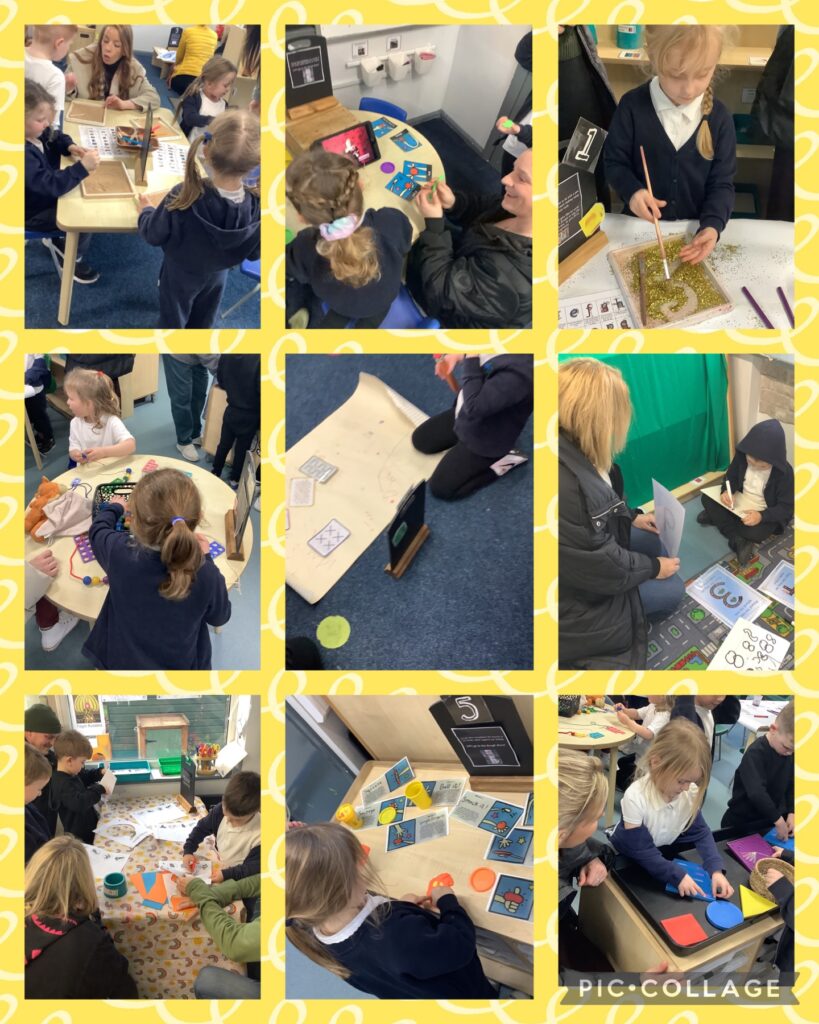
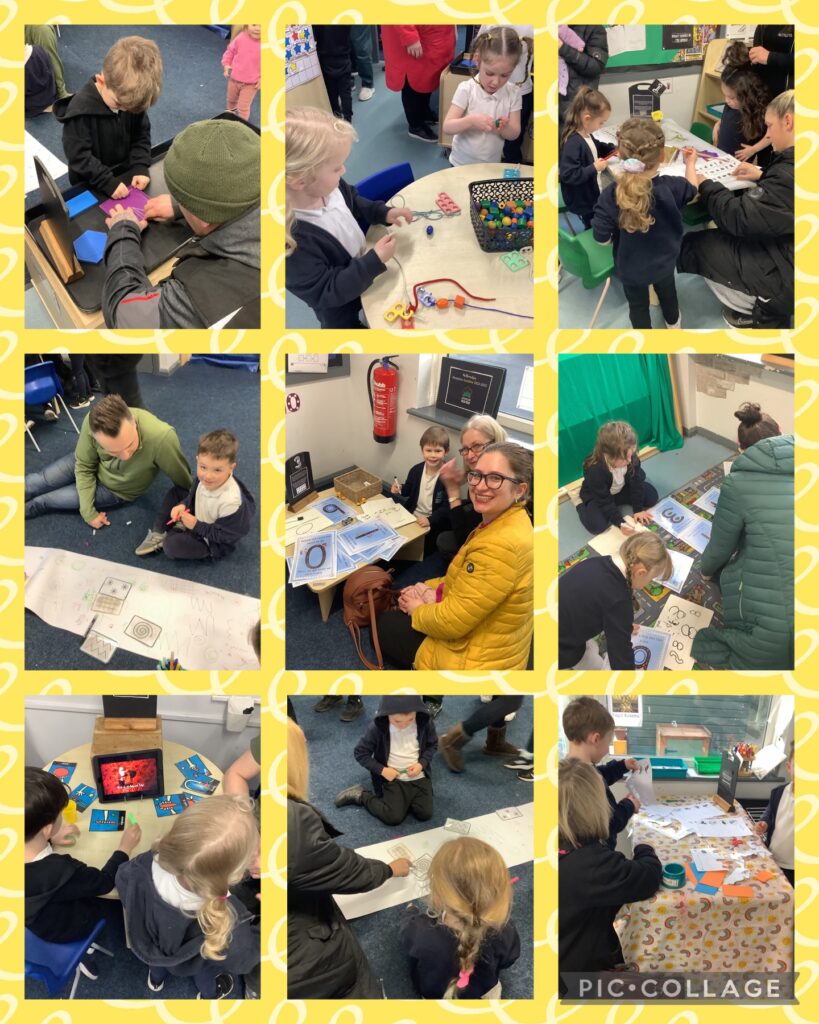
Half-term sponsored maths challenge
Your child has brought home a tens-frame sponsored challenge, for over half-term. All sponsorship money will go towards classroom resources and this year’s chosen charity- Cancer Research UK.
Reminders
SWIMMING DATES- Spring 2
Rainbow Class- 22 Feb, 8 Mar, 22 Mar
Sunshine Class- 1 Mar, 15 Mar, 29 Mar
These dates are also stuck to your child’s classroom door or window to view whenever needed.
When not swimming, this half term’s PE focus will be developing ball skills and counter balancing in pairs.
World Book Day 2023: Stay and Read – Thursday 02 March Time and further details to follow.
Happy half term! Enjoy the break and we’ll see you again on Monday 20 February.
Supertato!
It has been another fun week exploring ‘Supertato’ by Sue Hendra & Paul Linnet. We have been creating WANTED posters for Evil Pea. The children were able to write sentences using tricky words and known phonics.

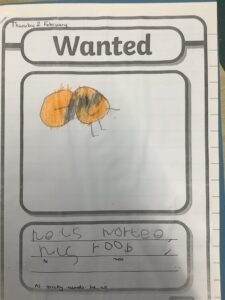
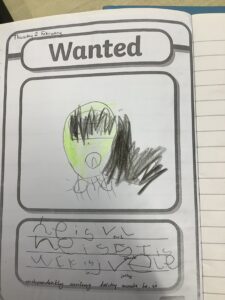
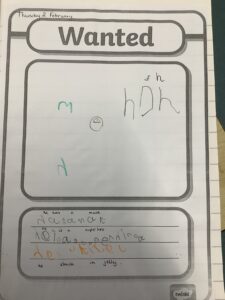
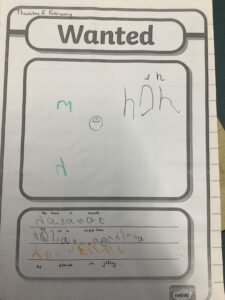
Top tip for watching YouTube with your child: go to the settings cog (it’s along the play bar) and turn off auto play – this avoids an inappropriate clip coming up automatically, and helps to discourage your child from passively watching clip after clip.
Word of the week
Every week, we look at a new adventurous word. We call this our ‘word of the week’. This week our word of the week was ‘villain’ – linked to the story ‘Supertato’. We looked at the definition. ‘A villain is the bad guy.’, drew pictures to represent villain’s and used the word villain in our everyday speech.
Evil Pea is a villain because he is mean to others.
A villain is a baddy!
I don’t like villains!
Maths
This week, the children have been exploring weight. We have focused on using mathematical vocabulary to compare different items.
heavy heavier heaviest
light lighter lightest

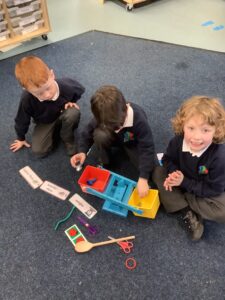


Phonics
This week, the children have been reading longer words. We use the chunking method to read words with more that one syllable. We have also spotted words containing double letters (e.g. rabbit) – these are diagraphs too!
Ask your child to chunk and read these words.
sunset chicken carpet carrot
Poetry Picnic
Each week, we will be learning a new poem. We will recite this poem each day. By saying the poem out loud we can focus on the sounds and rhythm of each word or line. We talk to the children about how this can help us become better readers. This week’s poem is Mrs Bluebird
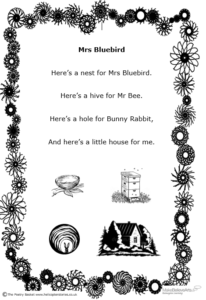
We talk about how a poem sometimes has rhyming words and sometimes doesn’t. Can your child tell you the rhyming words in this week’s poem? We also talk about how a poem can have a fast rhythm or a slow rhythm. Can your child re-tell this weeks poem to you?
Reminders
Early writing presentation – Don’t forget to watch the short presentation by Mrs Payne, one of our Sphere Federation Reception teachers. It has some ideas of things that you can try at home to support your child’s learning.
Supertato!
Supertato!
This week, in literacy we have been reading the book ‘Supertato’ by Sue Hendra & Paul Linnet. We have been retelling the story using actions and story maps.
Top tip for watching YouTube with your child: go to the settings cog (it’s along the play bar) and turn off auto play – this avoids an inappropriate clip coming up automatically, and helps to discourage your child from passively watching clip after clip.
Can your child retell the story Supertato to you at home? They could use the story maps below to help them – or even better, draw their own! Email us to let us how they did – your child will earn a challenge brick.
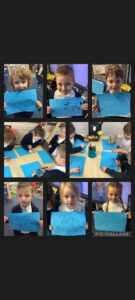
The children have also been busy doing lots of Supertato themed challenges. Here are some of the challenges they have been doing.
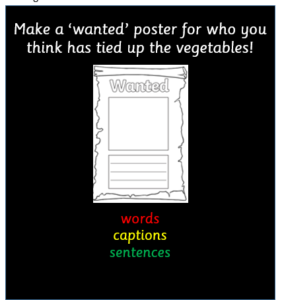
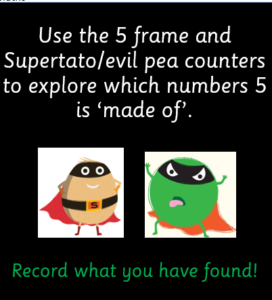

Challenge bricks – what is my child talking about?
Challenging activities are around the classroom for your child to complete to earn a brick. You might have seen them if you attended a stay and play recently – they are shown on blackboards in different areas of learning. The aim is to get a tower of bricks taller than SIX. Challenges include the learning we’re focusing on throughout the week.
Ask your child what challenges they’ve done this week.
At the end of the week, we talk about who has more and who has fewer bricks. If your child’s tower is more than SIX, your child will come home with a certificate.
Word of the week
Every week, we look at a new adventurous word. We call this our ‘word of the week’. This week our word of the week was ‘hero’ – linked to the story ‘Supertato’. We looked at the definition. ‘A person who is brave and good – often looked up to by others.’, drew pictures to represent hero’s and used the word hero in our everyday speech.
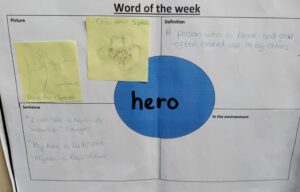
“I can see a hero – it’s Supertato” Georgie.
“My hero is Hulk” Jack.
“My hero is Rosie” Grace.
Maths
This week, the children have been developing their understanding of composition – the numbers within numbers.
We have been using the Hungarian number pattern (die pattern) as shown below.
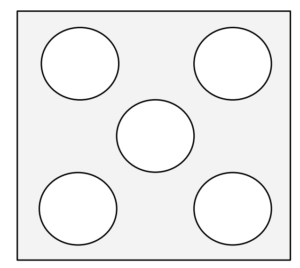
These key representations help your child to underline the ‘5-ness’ of 5. The children now have a great understanding of pairs of numbers that make 5!

“3 and 2 more…5”
“3 and 3 equals 6”
Phonics
This week, the children have learnt the new digraph ‘er’ – a digraph is ‘two letters that make one sound’. They have also learnt the new trigraph ‘air’ – a trigraph is ‘three letters that make one sound’.
Before reading a word we always look for any digraphs (two letters that make one sound) or trigraphs (three letters that make one sound). Then, we say the sound it makes. Finally, we sound out the word and blend it together – using our phoneme fingers! This helps your child identify the digraphs before reading a word.
Poetry Picnic
Each week, we will be learning a new poem. We will recite this poem each day. By saying the poem out loud we can focus on the sounds and rhythm of each word or line. We talk to the children about how this can help us become better readers. This week’s poem is ‘A little house’.
We talk about how a poem sometimes has rhyming words and sometimes doesn’t. Can your child tell you the rhyming words in this week’s poem? We also talk about how a poem can have a fast rhythm or a slow rhythm. Can your child re-tell this weeks poem to you?

Reminders
Reception Coffee Morning – Tuesday 31st January, 2023
After dropping your child off, stay at school for an informal chat with Mrs Beesley, the Reception staff and get to know the other parents, too. We will be in the new area of school called ” The Hub” from 9- 10am. Come and join us.
Stay and Play (fiddly fingers) – Friday 03 February at 2.pm– 3.20pm.
This is an opportunity for you to come into school to find out about the Early Years Curriculum and watch your child learn in school.
There will be a sign-up sheet in the classroom/after school club on Monday 30th January.
Reception Coffee Morning – 31.01.23
Reception Coffee Morning – Tuesday 31st January, 2023
After dropping your child off, stay at school for an informal chat with Mrs Beesley, the Reception staff and get to know the other parents, too. We will be in the new area of school called ” The Hub” from 9- 10am. Come and join us.
The Magic Paintbrush
The Magic Paintbrush
This week, we have focused on the story The Magic Paintbrush. We began by listening to the story for enjoyment. After becoming familiar with the story, we were then able to discuss the main events and characters.
The children then explored what they would do if they had a magic paintbrush.

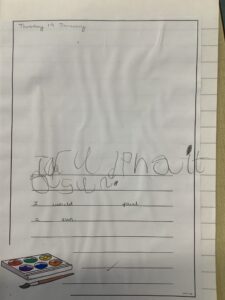
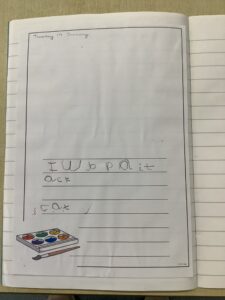
Top tip for watching YouTube with your child: go to the settings cog (it’s along the play bar) and turn off auto play – this avoids an inappropriate clip coming up automatically, and helps to discourage your child from passively watching clip after clip.
Maths
This week, we have consolidated our understanding of the composition of 5. We used the nursery rhyme 5 little speckled frogs to investigate different ways of making 5. By using part whole models and 10 frames, the children were able to represent their understanding in a range of ways.
Use the sentence 5 is made of __ and ___ to describe these images.
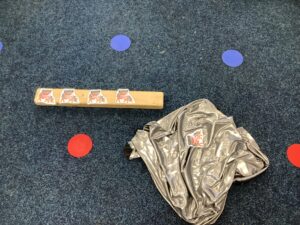

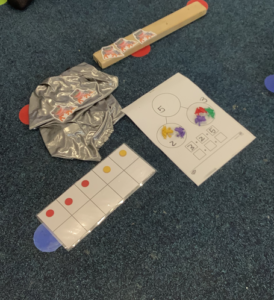
Phonics
This week, the children have learnt some new digraphs and trigraphs – a digraph/trigraph consists of ‘two/three letters that make one sound’. Ask your child to tell you the sounds the digraphs/trigraphs below make.
ur ow oi ear
Before reading a word we always look for any digraphs/trigraphs (two/three letters that make one sound). Then, we say the sound the digraph makes. Finally, we sound out the word and blend it together – using our phoneme (the sound a letter makes) fingers! This helps your child identify the digraphs/trigraphs (two/three letters that make one sound) before reading a word.
Find the diagraphs/trigraphs before reading these words.
hurt how coin fear
Poetry Picnic
Each week, we will be learning a new poem. We will recite this poem each day. By saying the poem out loud we can focus on the sounds and rhythm of each word or line. This week’s poem is ‘Jack and Jill’.
PE
This week, reception has continued to develop their balancing skills in a Foot Tech session and on the equipment.


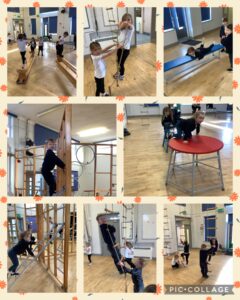
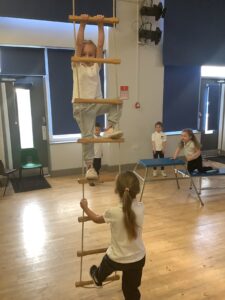
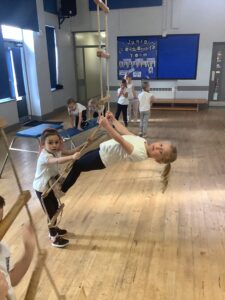

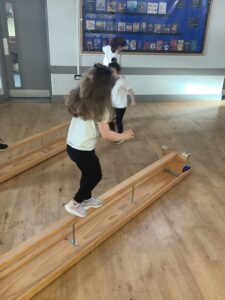
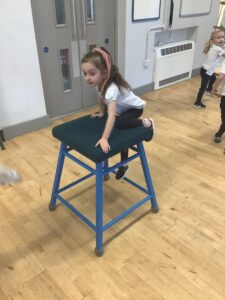
Stay and Play – Funky Phonics
Thank you to all the adults that were able to join our stay and play sessions this week.
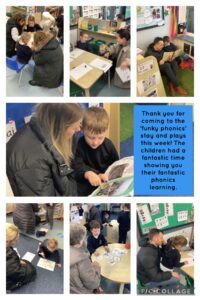
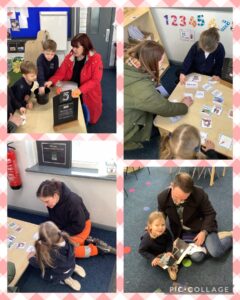
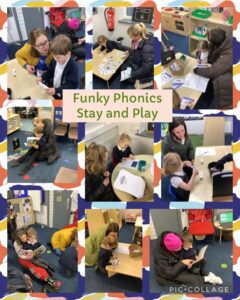
Learning in our areas
This week, we have explored Lunar New year. The children were able to compare the celebration to their own experiences.
I’ve seen fireworks before. We had them on New Years Eve.
I saw them (fireworks) on bonfire night.
I had new clothes on Christmas day.

Reminders
Swimming/Football
Spring 1 – swimming
Rainbow Class- 4 Jan, 18 Jan, 1 Feb
Sunshine Class- 11 Jan, 25 Jan, 8 Feb
When your child is not swimming, they will be taking part in Foot Tech Football sessions. Please ensure your child comes in PE kit every Wednesday, including suitable trainers.
Reading
Reading Records – return to school each Friday
Library books – return on Thursdays